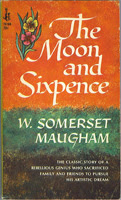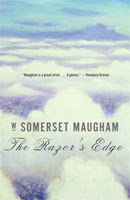
The Moon and Sixpence (1919) is a novel by W. Somerset Maugham about a man named Charles Strickland who abandons his wife and children and his career as a stockbroker in London to become an artist. Maugham’s story is based in part on the life of Paul Gauguin.
The story is narrated by a man who is an aspiring writer in London. He meets Mrs. Amy Strickland who hosts literary parties at her home. The narrator then meets her husband Charles. Unexpectedly, Charles Strickland abandons his family and leaves for Paris. Mrs. Strickland asks the narrator to go to Paris and talk to her husband.
In Paris, the narrator locates Charles Strickland and asks him why he left his wife. The narrator suspects that Strickland left to be with another woman. Strickland responds, "What poor minds women have got! Love. It's always love. They think a man leaves only because he wants others. Do you think I should be such a fool as to do what I've done for a woman?" The narrator asks, "Then, what in God's name have you left her for?" Strickland replies, "I want to paint."
Strickland is poor, but he cares little about his living situation. He is focused on his art. A Dutch artist named Dirk Stroeve recognizes Strickland’s genius and helps him. Coincidentally, Stroeve and the narrator are old friends. Friend may be the wrong word because the narrator doesn’t respect Stroeve, and he considers him a buffoon. Dirk Stroeve is a sharp contrast to Strickland. Stroeve’s paintings may not be considered great, but they are popular, and he is a successful and happy man. Many of his fellow artists ridicule Stroeve, but they borrow money from him all the same and take advantage of him. When Strickland falls deathly ill, Stroeve and his wife Blanche help him recover. Sadly, following Strickland’s recovery, Blanche leaves her husband for Strickland. When Blanche realizes that Strickland only wanted her as a model, Blanche kills herself.
Later, the narrator visits Tahiti after Strickland’s death, and he tries to learn about Strickland’s last years by talking with people there. The narrator learns that Strickland married a seventeen-year-old native girl named Ata and had children with her. Strickland became sick with leprosy and painted his best work on the walls of his hut. In the end, Strickland died of leprosy and lost his eyesight, and his wife burned his final work according to his wishes.
The theme of the book was that true artists must choose their art over everything else in life. Strickland was compelled to live this way. The narrator seemed to idolize Strickland for his devotion to his art although he knew that Strickland made cruel choices that adversely affected those around him. It’s a strange idea that a person cannot be devoted to their family and friends and also be an artist.
The most distasteful and disturbing thing about reading this novel was the misogyny running throughout it. Here are several quotes as examples:
When Strickland is speaking to the narrator, he says: "My dear fellow, I only hope you'll be able to make her see it. But women are very unintelligent."
Blanche’s doctor says this about her, “Women are constantly trying to commit suicide for love, but generally they take care not to succeed. It's generally a gesture to arouse pity or terror in their lover."
Strickland talks to the narrator about love, saying: "I don't want love. I haven't time for it. It's weakness. I am a man, and sometimes I want a woman. When I've satisfied my passion I'm ready for other things. I can't overcome my desire, but I hate it; it imprisons my spirit; I look forward to the time when I shall be free from all desire and can give myself without hindrance to my work. Because women can do nothing except love, they've given it a ridiculous importance. They want to persuade us that it's the whole of life. It's an insignificant part. I know lust. That's normal and healthy. Love is a disease. Women are the instruments of my pleasure; I have no patience with their claim to be helpmates, partners, companions."
Here's another quote from Strickland: "Women are strange little beasts," he said to Dr. Coutras. "You can treat them like dogs, you can beat them till your arm aches, and still they love you." He shrugged his shoulders. "Of course, it is one of the most absurd illusions of Christianity that they have souls."
This hatefulness towards woman disturbed me. I found Blanche Stroeve to be a more interesting character than either Strickland or the narrator. Mrs. Strickland was a compelling, strong character as well. In the end, I would have rather read more about them than the male characters.
I was also left wondering how much of the story was truly based on Paul Gauguin’s life and how much was fictionalized. One day, I’ll read a biography of Gauguin to find out.
Purchase and read books by W. Somerset Maugham:


© penciledpage.com




Search This Website